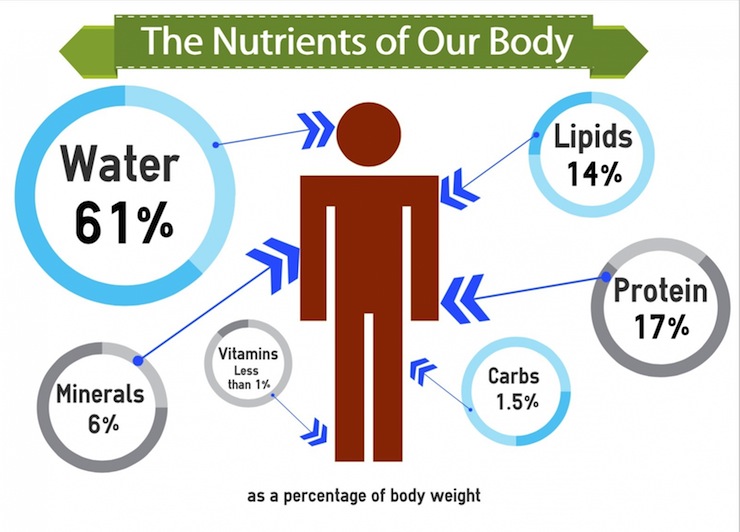{STEP 1} Use Nutrition Data to Learn about a
Healthy Diet
On this page, you'll find
|
Welcome to Nutrition 101 Understand basic nutrition data and you are well on your way to reaching your goals for a healthy diet.
|
What is a Healthy Diet and Why is it Worth My Time and Effort?
Great question! Unfortunately, there aren't a specific set of rules to follow that will ensure a healthy diet. Part of reason why is that you are unique. What may work for one individual doesn't necessarily guarantee success for another person.
The good news is that there are some general guidelines that underlie all healthy diets. They might seem a bit foreign but as your transformation takes place, these Components that Define a Healthy Diet will be committed to muscle memory in no time.
The real question on many peoples' minds is "Why Should I?" Chances are, you already have your reasons to make this positive change in your life. However, taking on this commitment is beneficial both mentally and physically, in the short and long-term. Learn more about the many Benefits of a Healthy Diet.
We Need Six Nutrient Groups to Thrive and Be Healthy Everyday
Your body is a very sophisticated machine that has thousands of processes ongoing simultaneously which work in harmony to keep you alive and healthy. On the most basic level, we put food in our body and it is converted to energy.
This energy is used in different ways (which we will learn about later). Think of this process similar to balancing a scale. If you put more food into your body than it needs on a daily basis, then there is extra energy. If you do this over the course of a few weeks, you might gain some weight. The opposite is also true.
We are in equilibrium when our body uses the same amount of energy from the food we eat on a daily basis. Nutrients are the substances in foods that contain energy for our bodies.
There are six types of nutrients we need to survive. Explore the nutrition data for each and learn what they are, how they work in our body, and where to find great sources of them for your healthy diet.
Macronutrients: Four Nutrients We Need A Lot Of
Our body gets all of its energy from three of these macronutrients - carbohydrates, lipids, and proteins. Let's take a look at them individually...
A relatively recent belief is that carbohydrates are bad for us. Believe it or not, eating carbohydrates are the ideal way to supply your body with energy.
In fact, this type of nutrient provides energy for many of the body's tissues including red blood cells, the brain, and central nervous system. Learn about carbohydrates, and why we should treat them as our friend, not an enemy. As we will discover, that doesn't necessarily mean all carbs are great for you either.
Lipids are a scientific term for fats and oils. They have a longer history of attached stigmas, however, are actually essential for our body to survive.
You may be surprised to learn that they are the main energy source for our muscles during rest and light exercise. They can store over twice the amount of energy as carbohydrates and also help transport vitamins throughout the body. Read our discussion on lipids, and how the different types function within our bodies.
Similar to carbohydrates, not all fats and oils are created equal. Recognizing which promote health and which prevent health is a step in creating a healthy diet plan.
Our body constantly creates new structures such as hormones and muscle tissue. Our immune system fights off countless diseases we encounter on a regular basis. For survival, we need to maintain proper balance of fluids and pH levels in our blood.
Protein is the workhorse of all the nutrients, and these are just a few tasks that it performs on a daily basis. Discover the importance of protein, and the facts of how our body uses it.
In the modern diet, protein is making a splash as a great nutrient to add more ,and more of, to meals. For some people this might be a great thing and contribute positively towards their diet, but for many, excessive protein is unnecessary and can be dangerous to our overall health.
As we saw in the infograph above, our body's weight is broken down by these percentages of the six major nutrient groups. All three of energy-yielding macronutrients taken together don't amount to the physical presence of water in our bodies.
It is the last of the four macronutrients, and its main job is to act as the vehicle to carry energy to and eliminate waste in our bodies cells. It is vital to life and without it, we are only capable of surviving a few days. Learn about water, and why it is our body's most indispensable nutrient.
Micronutrients: Nutrients We Often Lack from Diet Alone
Vitamins and minerals make up the group of micronutrients, which are needed in much smaller amounts for our body to function properly. On the other hand, minerals are a key component of bone structure as well as helping bodily fluids move.
The discovery of vitamins was potentially the most groundbreaking feat of the 20th century for nutritional science. A lot of nutrition data about vitamins is still a mystery, but we know they help with many of the fundamental processes in our body. Find out all the nutrition data on vitamins, and why a proper balance between them is key to a healthy diet.
Nutrition Labels: I Want to Eat It, But It Doesn't Have a Label!
While this seems like a problem, it could actually be a great problem to have! Any food that it is processed must bear a nutrition data label. However, whole foods are not held to this requirement. One of the biggest pitfalls of the modern diet is not eating enough unprocessed, unrefined foods.
In fact, nutritionists will disagree on many topics of conversation, but the one point they almost universally agree on it that we need to consume more vegetables and fruits on a daily basis. Fresh produce is the biggest section in the supermarket that you will find without labels.
Are You A Nutritionist, Dietitian, or Just a Health Freak?
Is there something people need to know about nutrition in order create, start, and maintain a healthy diet? Share your knowledge!
**As always, feel free to use the navigation below to backtrack and get an overview of Healthy Diet Mentor and our plan to get you on your way to a lifelong healthy diet.

